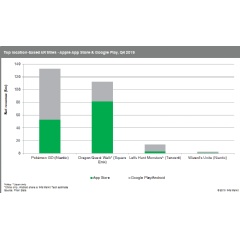Dragon Quest Walk the most successful location-based augmented reality title since Pokémon GO
Constantly seeking Pokémon GO’s successor
Globally, no location-based augmented reality (AR) title has managed to replicate the success of Pokémon GO. The performance of Niantic’s Harry Potter: Wizards Unite was flat and the title was dogged by complexity, despite the potential inherent to a global entertainment IP.
However, the genre has gained more traction in Asian markets. In China, Tencent’s Let’s Hunt Monsters was temporarily a top-earning title in 2019, but it failed to sustain growth, and has been recently crippled by the coronavirus outbreak whereby millions of people have been unable to go outside. Pokémon GO is not available in China due to restrictions surrounding Google Maps, and this title provides a close alternative.
Dragon Quest Walk attracts big spending in Japan for Square Enix
In Japan, Square Enix’s Dragon Quest Walk has performed remarkably. The game replicates the Pokémon GO experience, but with a Dragon Quest skin. It launched on September 10th 2019 and had generated $153.3m in net revenue by the end of the year, as well as consistently remaining within the top 5-grossing mobile games for Japan since its launch – comfortably out-performing Pokémon GO in Q4 by $69m. The strong installed base of iOS devices in Japan, and the higher spending power associated with their owners, is demonstrated in Dragon Quest Walk’s Q4 net revenue results.
Dragon Quest Walk was by far the best-performing title of the year for Square Enix, demonstrating the high spending power of the Japanese market. The Dragon Quest IP is wildly popular in Japan, but has failed to really take root internationally. As such, an overseas launch seems both unlikely and unnecessary: it is currently generating enough revenue to rival the global figures of Pokémon GO in Japan alone.
Augmented reality is a minor selling point for “AR” titles thus far
Despite being positioned as AR-games, the likes of Pokémon GO offer an opt-in AR experience which does not represent the core of the gameplay. Their appeal is more likely to be centred on the collectible aspect: the constant hunt for rare monsters and the satisfaction in locating one. It is likely that many users do not ever engage with the optional AR feature. What’s more, the performances of these titles would suggest that original gaming IP tends to fare better.
Comparatively, Mojang’s Minecraft Earth brings the AR component to the fore. It is available in early access across select territories, launching in the US in November. The game uses OpenStreetMap for map information and Microsoft Azure for its AR features. Its most recent update in late January, saw a reduction in the game’s file size as well as numerous bug-fixes and UI improvements. Despite the slow rollout of Minecraft Earth, the constant stream of updates indicates that the developers are very much invested in making the game a success – like Pokémon, the Minecraft IP certainly has a strong and established history in the games landscape.
By Louise Shorthouse, Ph.D. Research Analyst I - Games & Apps, IHS Markit
( Press Release Image: https://photos.webwire.com/prmedia/5/254925/254925-1.png )
WebWireID254925
This news content was configured by WebWire editorial staff. Linking is permitted.
News Release Distribution and Press Release Distribution Services Provided by WebWire.
